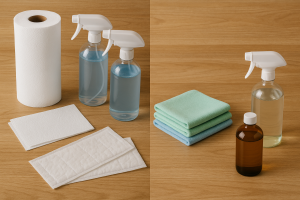 The way we clean our homes is changing. More people are asking not just for spotless kitchens and fresh-smelling living rooms, but also for cleaning services that protect the planet. Traditional cleaning often relies on disposable products and harsh chemicals that create undeserved waste. But residential cleaning experts are finding more innovative, greener methods. By focusing on sustainable practices, they can reduce waste, cut costs, and provide healthier homes.
The way we clean our homes is changing. More people are asking not just for spotless kitchens and fresh-smelling living rooms, but also for cleaning services that protect the planet. Traditional cleaning often relies on disposable products and harsh chemicals that create undeserved waste. But residential cleaning experts are finding more innovative, greener methods. By focusing on sustainable practices, they can reduce waste, cut costs, and provide healthier homes.
Why Cleaning Creates So Much Waste
Most waste in house cleaning comes from two sources: disposable products and packaging. Think of the endless paper towels, single-use mop pads, plastic bottles, and throwaway gloves. Many of these items end up in landfills after only one use. On top of that, chemical-heavy products require plastic packaging and sometimes come in small, non-refillable containers.
The other problem is overuse. Many cleaning routines call for far more detergent, disinfectant, or water than necessary. This doesn’t just waste resources; it increases pollution when harsh cleaners are washed down drains. The result is a cycle of waste that affects both households and the environment.
The Shift to Reusable Supplies
One of the easiest ways cleaning services can reduce waste is by switching to reusable tools. Instead of paper towels, microfiber cloths can be washed and reused hundreds of times. Mop heads can be laundered as well, cutting down on single-use pads. Even cleaning gloves now come in durable versions that last for months instead of days.
Microfiber has an extra advantage: it often cleans effectively with just water. That means fewer chemical sprays are needed, lowering both plastic waste and chemical exposure inside the home.
Bulk Buying and Refillable Containers
Another growing practice is using bulk containers and refill stations. Instead of purchasing dozens of small spray bottles, companies can buy large concentrated cleaners and refill reusable bottles. Some services even set up mobile refill stations in their vans, so staff always have enough supply without carrying unnecessary packaging.
Concentrated cleaners reduce shipping waste as well. Less packaging, fewer deliveries, and smaller transport footprints all add up to a significant environmental benefit.
Eco-Friendly Cleaning Products
Sustainable cleaning isn’t just about reducing physical waste—it’s also about choosing products that don’t harm the environment once they’re rinsed away. Many cleaning services are now using biodegradable plant-based solutions. These products break down safely and avoid the harmful buildup of chemicals in waterways.
Some companies make their own cleaning mixes using simple ingredients like vinegar, baking soda, and essential oils. These homemade blends cut down on packaging waste and avoid toxic residues. While not every cleaner can be replaced this way, these alternatives are often effective for routine household cleaning.
Smarter Scheduling and Efficient Use
Sustainability also comes from how cleaning is managed. For example, scheduling cleanings by neighborhood reduces travel time and fuel use. Using digital scheduling instead of paper checklists saves resources as well.
On the job, staff can be trained to use only the amount of product necessary, thereby avoiding wasteful spraying or excessive rinsing. Over time, these small changes can cut down on both material use and chemical runoff.
Waste Separation and Recycling
Cleaning services are in a unique position to help households with recycling, too. Many companies now separate waste as they clean, making sure recyclables aren’t thrown out with regular trash. They can also help educate homeowners about local recycling programs, composting options, and the proper disposal of items such as batteries and electronics.
Some services go further, offering to collect old cleaning product bottles, refill them, or recycle them through proper channels. This helps close the loop on packaging waste.
The Role of Consumers
While cleaning services can lead the way, homeowners also play a role. Asking questions about products and practices encourages companies to stay accountable. Choosing services that emphasize sustainability signals to the market that waste reduction matters.
At home, small actions like providing washable rags instead of paper towels or setting up easy-to-access recycling bins make it easier for cleaning teams to work sustainably. Collaboration between the service and the homeowner ensures that waste reduction is a shared effort.
Why It Matters
Waste from cleaning may seem small compared to global environmental challenges, but it adds up. Millions of households utilize these services every week, and the resulting amount of disposable waste is substantial. Reducing this waste helps conserve resources, limit pollution, and make homes healthier.
It also makes financial sense. Reusable tools last longer, bulk supplies cost less per use, and efficient practices save time. Companies that adopt sustainable methods often see lower operating costs, while customers get the benefit of eco-friendly cleaning without higher prices.
A Cleaner Future
Sustainable house cleaning is about more than tidy homes—it’s about rethinking how we use resources in everyday tasks. By choosing reusable supplies, refillable containers, eco-friendly products, efficient routines, and better recycling, cleaning services can cut down on waste while delivering the same sparkling results.
The shift is already happening. Many cleaning businesses now market themselves as “green” or “eco-friendly,” and more consumers are seeking out these options. As awareness grows, sustainable cleaning will likely become the standard rather than the exception.
A clean home should not come at the cost of a dirty planet. With thoughtful practices and smarter choices, house cleaning services can help reduce waste and move us all toward a healthier, more sustainable future.

